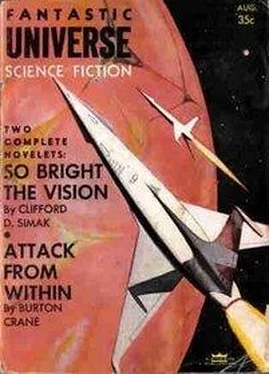Robert Silverberg - The Macauley Circuit
Здесь есть возможность читать онлайн «Robert Silverberg - The Macauley Circuit» весь текст электронной книги совершенно бесплатно (целиком полную версию без сокращений). В некоторых случаях можно слушать аудио, скачать через торрент в формате fb2 и присутствует краткое содержание. Год выпуска: 1956, Издательство: King-Size Publications, Inc., Жанр: Фантастика и фэнтези, на английском языке. Описание произведения, (предисловие) а так же отзывы посетителей доступны на портале библиотеки ЛибКат.
- Название:The Macauley Circuit
- Автор:
- Издательство:King-Size Publications, Inc.
- Жанр:
- Год:1956
- ISBN:нет данных
- Рейтинг книги:5 / 5. Голосов: 1
-
Избранное:Добавить в избранное
- Отзывы:
-
Ваша оценка:
- 100
- 1
- 2
- 3
- 4
- 5
The Macauley Circuit: краткое содержание, описание и аннотация
Предлагаем к чтению аннотацию, описание, краткое содержание или предисловие (зависит от того, что написал сам автор книги «The Macauley Circuit»). Если вы не нашли необходимую информацию о книге — напишите в комментариях, мы постараемся отыскать её.
The Macauley Circuit — читать онлайн бесплатно полную книгу (весь текст) целиком
Ниже представлен текст книги, разбитый по страницам. Система сохранения места последней прочитанной страницы, позволяет с удобством читать онлайн бесплатно книгу «The Macauley Circuit», без необходимости каждый раз заново искать на чём Вы остановились. Поставьте закладку, и сможете в любой момент перейти на страницу, на которой закончили чтение.
Интервал:
Закладка:
The Macauley Circuit
by Robert Silverberg
I don’t deny I destroyed Macauley’s diagram; I never did deny it, gentlemen. Of course I destroyed it, and for fine, substantial reasons. My big mistake was in not thinking the thing through at the beginning. When Macauley first brought me the circuit, I didn’t pay much attention to it—certainly not as much as it deserved. That was a mistake, but I couldn’t help myself. I was too busy coddling old Kolfmann to stop and think what the Macauley circuit really meant.
If Kolfmann hadn’t shown up just when he did, I would have been able to make a careful study of the circuit and, once I had seen all the implications, I would have put the diagram in the incinerator and Macauley right after it. This is nothing against Macauley, you understand; he’s a nice, clever boy, one of the finest minds in our whole research department. That’s his trouble.
He came in one morning while I was outlining my graph for the Beethoven Seventh that we were going to do the following week. I was adding some ultrasonics that would have delighted old Ludwig—not that he would have heard them, of course, but he would have felt them—and I was very pleased about my interpretation. Unlike some synthesizer-interpreters, I don’t believe in changing the score. I figure Beethoven knew what he was doing, and it’s not my business to patch up his symphony. All I was doing was strengthening it by adding the ultrasonics. They wouldn’t change the actual notes any, but there’d be that feeling in the air which is the great artistic triumph of synthesizing.
So I was working on my graph. When Macauley came in I was choosing the frequencies for the second movement, which is difficult because the movement is solemn but not too solemn. Just so. He had a sheaf of paper in his hand, and I knew immediately that he’d hit on something important, because no one interrupts an interpreter for something trivial.
“I’ve developed a new circuit, sir,” he said. “It’s based on the imperfect Kennedy Circuit of 2261.”
I remembered Kennedy—a brilliant boy, much like Macauley here. He had worked out a circuit which almost would have made synthesizing a symphony as easy as playing a harmonica. But it hadn’t quite worked—something in the process fouled up the ultrasonics and what came out was hellish to hear—and we never found out how to straighten things out. Kennedy disappeared about a year later and was never heard from again. All the young technicians used to tinker with his circuit for diversion, each one hoping he’d find the secret. And now Macauley had.
I looked at what he had drawn, and then up at him. Hewas standing there calmly, with a blank expression on his handsome, intelligent face, waiting for me to quiz him.
“This circuit controls the interpretative aspects of music, am I right?”
“Yes, sir. You can set the synthesizer for whatever esthetic you have in mind, and it’ll follow your instruction. You merely have to establish the esthetic coordinates—the work of a moment—and the synthesizer will handle the rest of the interpretation for you. But that’s not exactly the goal of my circuit, sir,” he said, gently, as if to hide from me the fact that he was telling me I had missed his point. “With minor modifications—”
He didn’t get a chance to tell me, because at that moment Kolfmann came dashing into my studio. I never lock my doors, because for one thing no one would dare come in without good and sufficient reason, and for another my analyst pointed out to me that working behind locked doors has a bad effect on my sensibilities, and reduces the esthetic potentialities of my interpretations. So I always work with my door unlocked and that’s how Kolfmann got in. And that’s what saved Macauley’s life, because if he had gone on to tell me what was on the tip of his tongue I would have regretfully incinerated him and his circuit right then and there.
Kolfmann was a famous name to those who loved music. He was perhaps eighty now, maybe ninety, if he had a good gerontologist, and he had been a great concert pianist many years ago. Those of us who knew something about pre-synthesizer musical history knew his name as we would that of Paganini or Horowitz or any other virtuoso of the past, and regarded him almost with awe.
Only all I saw now was a tall, terribly gaunt old man in ragged clothes who burst through my doors and headed straight for the synthesizer, which covered the whole north wall with its gleaming complicated bulk. He had a club in his hand thicker than his arm, and he was about to bash it down on a million credits’ worth of cybernetics when Macauley effortlessly walked over and took it away from him. I was still too flabbergasted to do much more than stand behind my desk in shock.
Macauley brought him over to me and I looked at him as if he were Judas.
“You old reactionary,” I said. “What’s the idea? You can get fined a fortune for wrecking a cyber—or didn’t you know that?”
“My life is ended anyway,” he said in a thick, deep, guttural voice. “It ended when your machines took over music.”
He took off his battered cap and revealed a full head of white hair. He hadn’t shaved in a couple of days, and his face was speckled with stiff-looking white stubble.
“My name is Gregor Kolfmann,” he said. “I’m sure you have heard of me.”
“Kolfmann, the pianist?”
He nodded, pleased despite everything. “Yes, Kolfmann, the former pianist. You and your machine have taken away my life.”
Suddenly all the hate that had been piling up in me since he burst in—the hate any normal man feels for a cyberwrecker—melted, and I felt guilty and very humble before this old man. As he continued to speak, I realized that I—as a musical artist—had a responsibility to old Kolfmann. I still think that what I did was the right thing, whatever you say.
“Even after synthesizing became the dominant method of presenting music,” he said, “I continued my concert career for years. There were always some people who would rather see a man play a piano than a technician feed a tape through a machine. But I couldn’t compete forever.” He sighed. “After a while anyone who went to live concerts was called a reactionary, and I stopped getting bookings. I took up teaching for my living. But no one wanted to learn to play the piano. A few have studied with me for antiquarian reasons, but they are not artists, just curiosity-seekers. They have no artistic drive. You and your machine have killed art!”
I looked at Macauley’s circuit and at Kolfmann, and felt as if everything were dropping on me at once. I put away my graph for the Beethoven, partly because all the excitement would make it impossible for me to get anywhere with it today and partly because it would only make things worse if Kolfmann saw it. Macauley was still standing there, waiting to explain his circuit to me. I knew it was important, but I felt a debt to old Kolfmann, and I decided I’d take care of him before I let Macauley do any more talking.
“Come back later,” I told Macauley. “I’d like to discuss the implications of your circuit, as soon as I’m through talking to Mr. Kolfmann.”
“Yes, sir,” Macauley said, like the obedient puppet a technician turns into when confronted by a superior, and left. I gathered up the papers he had left me and put them neatly at a corner of my desk. I didn’t want Kolfmann to see them, either, though I knew they wouldn’t mean anything to him except as symbols of the machine he hated.
When Macauley had gone I gestured Kolfmann to a plush pneumochair, into which he settled with the distaste for excess comfort that is characteristic of his generation. I saw my duty plainly—to make things better for the old man.
Читать дальшеИнтервал:
Закладка:
Похожие книги на «The Macauley Circuit»
Представляем Вашему вниманию похожие книги на «The Macauley Circuit» списком для выбора. Мы отобрали схожую по названию и смыслу литературу в надежде предоставить читателям больше вариантов отыскать новые, интересные, ещё непрочитанные произведения.
Обсуждение, отзывы о книге «The Macauley Circuit» и просто собственные мнения читателей. Оставьте ваши комментарии, напишите, что Вы думаете о произведении, его смысле или главных героях. Укажите что конкретно понравилось, а что нет, и почему Вы так считаете.












